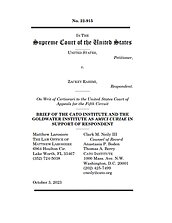Learn more about Cato’s Amicus Briefs Program.
Federal law prohibits various categories of people from owning firearms, including “unlawful user[s]” of controlled substances, convicted felons, and, as relevant to this case, people who are subject to a domestic violence restraining order issued by any state court. Despite the laudable goal of that restriction, set forth at 28 USC § 922(g)(8), it was enacted before District of Columbia v. Heller (2008) held that the Second Amendment protects an individual right to own firearms and fails to provide sufficient procedural protections to ensure that only truly dangerous people are stripped of their fundamental right to armed self-defense.
Earlier this year, the Fifth Circuit Court of Appeals struck down 922(g)(8) on the grounds that there was no remotely analogous historical law or custom, as required by the Supreme Court’s most recent gun-related case, New York Rifle & Pistol Ass’n v. Bruen (2022). The government appealed that ruling to the Supreme Court, which granted review to decide whether the provision of federal law barring nearly anyone who is subject to a domestic violence restraining order from owning a firearm (notably, police and other members of law enforcement are exempted with respect to government-issued weapons) is facially unconstitutional—and not just as applied to the criminal defendant in this case, Zackey Rahimi, who was convicted of illegally possessing a pistol and a rifle following the issuance of an agreed protection order against him in Texas.
Cato’s brief argues that besides violating the Second Amendment under the text, history, and tradition framework articulated by the Supreme Court in Bruen, § 922(g)(8) is unconstitutional because it fails to provide gun owners with adequate due process before dispossessing them of their firearms and stripping them of their fundamental right of armed self-defense. Among other things, there is no requirement to inform gun owners against whom a protective-order proceeding has been initiated that a consequence of the order being issued is that they will immediately and automatically lose their right to own guns. Nor is there any provision in the law for appointing counsel for indigent gun owners or any requirement for the court issuing a restraining order to make any factual or legal findings to aid in an appeal. Moreover, there is abundant scholarship that indicates domestic violence orders are sometimes used tactically by both spouses in divorce proceedings and are handed out by some judges as a matter of routine without any serious consideration of the underlying facts and evidence.
Congress’s goals in seeking to protect victims of domestic violence are certainly laudable, but they must be pursued through constitutional means. There is simply no basis in historical practice or sound public policy for stripping hundreds of thousands of people each year of their fundamental right of armed self-defense without a suitably rigorous process for establishing who represents a genuine threat and who does not. Thus, the law will need to be rewritten if some version of it is to remain in effect, and it is Congress’s job to do that, not the Supreme Court’s.
View this case’s court docket, including the full opinion, here.

This work is licensed under a Creative Commons Attribution-NonCommercial-ShareAlike 4.0 International License.

